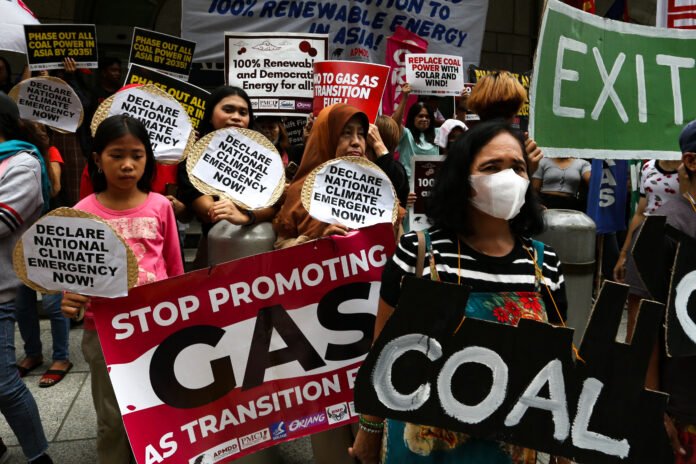MANILA–Climate campaigners demonstrated in front of the Asian Development Bank (ADB) headquarters today calling on the delegates to this year’s Asia Clean Energy Forum (ACEF) to enable Asia’s rapid transition to renewable energy systems by 2050.
ADB, along with the United States Agency for International Development (USAID) and the Korea Energy Agency (KEA), is hosting hundreds of clean energy practitioners from Asia for the 19th edition of ACEF from June 3 to 7.
“We urge ACEF to walk its talk on accelerating the clean energy transition, to go beyond discussion of insights and approaches that accelerate the clean energy transition and instead act as a forum to push and enable Asian countries to achieve fossil fuel phase out by 2035 and just and equitable transition to 100% renewables by 2050,” said Lidy Nacpil, coordinator of Asian Peoples’ Movement on Debt and Development (APMDD).
Nacpil added: “In Asia, millions of people still have no access to electricity while many more are making do with dirty fuel that lead to premature deaths or with unreliable but costly electricity. We must strive to transition to clean energy that can provide accessible and affordable power for all. This is to avoid a climate catastrophe as well as to support the development of people and communities.”
The theme of this year’s ACEF is “Accelerating the Clean Energy Transition and Ensuring Energy Security and Affordability – Time for Urgent Action Now”.
Participants include government agencies, private sector, equipment and service providers, financiers, philanthropic organizations, researchers and non-governmental organizations.
“Achieving Asia’s just transition to clean energy requires significant financing for renewable energy projects. We also need financing to rapidly phase-out coal. We urge ACEF to walk its talk by enabling a total coal exit in Asia and complete replacement with solar and wind. This requires the building of finance needed for coal phase out and the rapid deployment of renewables towards supplanting fossil fuels in the energy mix,” said Ian Rivera, coordinator of Philippine Movement for Climate Justice (PMCJ).
Manjette Lopez, national president of SANLAKAS, called on ACEF participating countries’ public financial institutions to make an immediate, wholesale shift of fossil fuel financing to RE financing to fund the rapid integration of more renewable energy capacity, particularly wind and solar, into the power mix in the region.
“Public financial institutions, as well as private banks, continue to finance and underwrite fossil fuel projects despite warnings that there is no more room for new oil, gas and coal within this decade if we want to keep global warming to a level that is safe for people and the planet. Governments, especially those participating in ACEF, touting the urgency of a clean energy transition can make this happen quickly if they make a shift to financing renewables now.”
Flora Santos, president of Oriang Women’s Movement, called on ACEF delegates to push for the implementation of policies for rapid, equitable, and just transition to one hundred percent renewable sources of power by 2050 and do away with false solutions and technologies.
“Fossil fuel corporations and other ACEF participants are putting on the table false solutions and technologies, such as hydrogen, carbon capture utilization and storage, ammonia, including the promotion of gas as a transition fuel from coal. These are dirty sources of energy that only serve to entrench fossil fuels and make profits off of them, and delay the clean energy transition. We need to make the transition to clean energy technologies starting now.”
Phasing out fossil fuels and replacing them with renewable energy sources is a very important and urgent step to dramatically reduce carbon emissions.
According to the Intergovernmental Panel on Climate Change (IPCC), without strong, rapid, and sustained reductions in greenhouse gas emissions, and reaching net zero carbon emissions, the risks and adverse impacts from climate change will escalate with increasing global warming.
Prioritizing equity, social justice, inclusion and just transition processes would enable ambitious climate mitigation actions and climate-resilient development.
The latest IPCC report has found that emissions have increased global average temperatures by at least 1.1 degrees Celsius.
This means the world is likely to surpass 1.5C by the early 2030s unless countries drastically transform their economies and immediately transition away from fossil fuels. ADB still provides funding for gas projects.
Despite its latest energy policy providing restrictions on investments in gas, including ceasing upstream support for the gas industry, at least in their direct finance, it has approved around US$5 billion between 2016 and 2021 for gas projects through technical assistance. (APMDD)
Photo by Asia Press Photo




